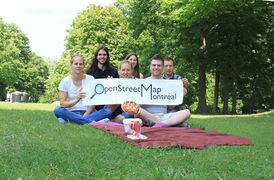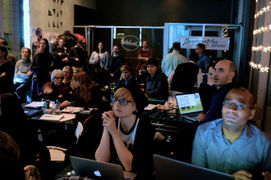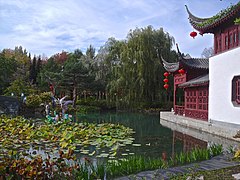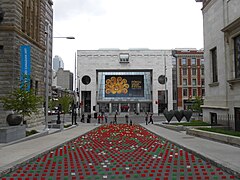State Of The Map 2016/Call for venues/Montreal
| This bid is updated. The original bid, as of April 15th is preserved. |
State of the Map 2016 in Montréal, Québec, Canada
Welcome to the bid proposal page to host the State of the Map 2016, in Montréal, Québec, Canada. The bid is steered by OpenStreetMap Montréal (website in french) group.

SotM 2016 - Montréal vision
State of the Map - Montréal will promote the future of OpenStreetMap through outreach. We plan to bring this vision to life by collaborating with academics in Montréal and aligning our event with the World Social Forum 2016 (WSF).
Why Montréal?
The city of Montréal has a lot to offer to an international event. Montréal is a fully bilingual (french and english), cosmopolitan city with a diverse representation of cultural and ethnic minorities where everyone can feel welcome. The cost of living is particularly low compared to other large, north american cities and for international travelers, this is especially marked with the current Canadian dollar/US dollar exchange rate.
In addition to Montréal being a prime location, the World Social Forum (WSF) will be held here in August 2016. During the WSF, thousands of NGOs and people from many other social initiatives will meet in Montréal. We think the alignment of the two events is a double opportunity for the OpenStreetMap project and its community. By organizing the State of the Map event during or close to the WSF, we will have:
- an opportunity to reach many more people than during previous editions. We will have an opportunity to promote the OpenStreetMap project to a very wide, international, audience;
- an excellent occasion to do networking in social communities, a field where OSM, thanks to its philosophy, has a head start on other commercial geographic data providers.
We will also encourage the OpenStreetMap community to organize outreach activities during the SotM: Invade the streets and make your own mini-event live - even in your native language. That outreach opportunity is the objective of aligning the dates of our event with the World Social Forum.
Who is the SotM Montréal Team?
The OpenStreetMap Montréal local community was born in 2013 starting with some enthusiasts. Since the beginning, the group is focusing on making OpenStreetMap known throughout the city. As well as organizing monthly meetings for contributors and mapping party activities, the group also regularly collaborates with third party individuals, citizen groups, non-profits, associations, companies and public administration to provide them help on OSM data usage.
OpenStreetMap Montréal key dates:
- May 2013: creation of the group and first activities organized
- December 2013: start of monthly meetings for local contributors
- February 2014: a booth and mapping party are organized during the Wikicité event (in french), a colloquium about citizen participation in the digital era
- March 2014: OpenStreetMap Montréal and OpenStreetMap Capitale Nationale (Québec city) join their forces to create the OpenStreetMap Québec banner. The aim is to reinforce collaboration and help new communities in the province of Québec to grow
- September 2014: through collaborations with elected city officials and employees, the group gets a licence exception allowing to reuse the official city open data in OSM
- February 2015: the public_bookcase tag is created in collaboration with the local micro-library network. OpenStreetMap Montréal members participate in the organization of a public activity on the topic of micro-libraries
-
10th birthday in Montreal celebration group -
Participants at the micro-library event in February 2015
This bid is so far led by three members of the larger OpenStreetMap Montréal local community, specifically:
- Charles Kiyanda (OSM account)
- Pierre Choffet (OSM account, Peuc on OFTC, chans #osm, #osm-ca, #osm-fr)
- Christophe Lefrancois (OSM account)
The core team of OSM Montréal is 5 people, and more members are likely to add themselves to the team should our bid be accepted.
This bid is also officially supported by the OpenStreetMap Capitale Nationale (Québec city) local community.
In order to ensure a good synergy between the SotM and the World Social Forum, we are already in contact with the WSF organization team, which supports this bid.
Description of Potential Partnerships
The vision of the Montréal team being outreach, we have already communicated with different community actors and elaborated certain ideas for partnerships. The two groups we are having discussions with are the WSF organisation team and Prof. Caquard, from Concordia University.
The World Social Forum
The world social forum was initially created as a counter force mobilization to the world economic forum. Since its inception, it has grown beyond being a counter mobilization to an event in its own right. Every year, tens of thousands of actors from community groups, social organizations, non-governmental organizations, etc join in one location to discuss on both local and global social issues and opportunities. The 2016 event will very special because it will be the first edition in Northern hemisphere. Organizers expect between 50,000 and 80,000 attendees from 120 countries during a 5 to 7 days event. They also expect 1,500 activities to be held during this edition.
The different community members that meet during the WSF probably share common, basic values with the OpenStreetMap community and sub-groups within the OpenStreetMap community, namely values surrounding the free and open circulation of information and data, sharing and the sharing economy, community building and the interaction between local and global action. We can think of the Humanitarian OpenStreetMap Team as a part of our community that probably shares a lot with communities represented in the WSF.
Our goal is not to transform the SotM to be accessible or necessarily useful or inviting to those outside of our community. Our goal is to organize a SotM that is the essential tool we need for our community and organize outreach events within the context of the WSF to introduce outside communities to OpenStreetMap, its tools, its uses, and its values.
Prof. Caquard and Concordia University
Prof. Sébastien Caquard is an assistant professor at Concordia University in Geography, Planning and Environment. We came in contact with him after finding some of his publications where he discussed both OpenStreetMap as a tool and some facets of the OpenStreetMap community. Prof. Caquard also uses OpenStreetMap with his students in one of his classes. He has shown interest in participating in the organization of the SotM, possibly involving university students. While we have only had short communications with Prof. Caquard, he has expressed interest and his involvement would also open up possibilities of holding the SotM at Concordia University without a fee or with a reduced fee.
When?
Forget what you think you know about Québec weather! Summer in Montréal is sunny and warm, and August is definitely the best moment of the year to visit Montréal. Any restaurant that has the room will have an outdoor terrace. There are also a number of international activities normally happening throughout the summer and any person wanting to extend their visit either before or after SotM will be able to take advantage of any one of those opportunities. To name a few:
- International Jazz Festival, mid to end of June
- Francopholies Festival (french music), end of June to beginning of July
- Fantasia Festival (animé, horror, sci-fi and fantastic film festival), mid July to beginning of August
- Festival des Films du Monde (Montréal's world film festival), end of august to beginning of September
- Festival Nuit d'Afrique, mid to end of July
- International fireworks festival, throughout the summer every Wednesday and Saturday evening
Specifically, we propose to hold SoTM during first half of August 2016, when the world social forum will be held in Montréal as well. One possibility is to have SotM overlap with the first two or last two days of the WSF, i.e. that 1-2 days would be SotM only and 1-2 days would be shared with the WSF. It would also be possible to schedule SotM completely within the WSF. Either alignment of the dates of the SotM with those of the WSF will allow members of the OSM community to participate in activities of the WSF and vice-versa.
Where?
Montréal has 5 major universities, a big convention center, and many hotel conference rooms in downtown. This allows us to meet the SotM committee expectations in term of price (from free to a few thousand canadian dollars), size, and atmosphere (university lecture hall or more relaxed).
Possible venues currently explored.
- Concordia University (in possible association with Prof. Caquart of the Geography department) or the Université du Québec à Montréal.
- Within the context of the WSF, in which case the logistics organization (room booking, AV, etc) would essentially be subcontracted to the WSF team and we would be developing only the content of the SotM. This is a more unusual approach for SotM and is only exploratory at the moment as it would have consequences in terms of visibility (we would become an event of the WSF) and in terms of price (logistics costs would be minimal).
- Hotel conference rooms
Our current plan is to have 3 rooms: 1 for ~400 persons, and 2 for ~150 persons. That will allow us to keep the 3 parallel tracks format we had past years, yet have events that are expected to reach all participants at certain times in the conference.
We also are planning on having smaller, additional spaces for attendees to meet and work together on the best OSM tools of tomorrow.
Proposed Format for SotM Events
We are envisioning a 3 to 4 day event partially overlapping with the WSF. A possible 4 day organization is as follows:
| Day | AM | PM | |
| 1 | SotM only | Welcome and Greetings | Presentations in parallel tracks |
| Presentations in parallel tracks | |||
| 2 | SotM only | Plenary lecture | Presentations in parallel tracks |
| Presentations in parallel tracks | |||
| 3 | 1st day of WSF | Plenary lecture | Outreach events in different languages: for WSF participants, led by SotM participants |
| Presentations in parallel tracks | Introduction to OpenStreetMap: uses and advantages | ||
| Contributing data to OpenStreetMap | |||
| Using and embedding OpenStreetMap data within your projects | |||
| 4 | 2nd day of WSF | Plenary lecture | PM off (no SotM events) |
| Presentations in parallel tracks | Encourage SotM participants to visit events in WSF and/or work in small groups |
Possible Alignment to the World Social Forum
The World Social Forum is an international gathering originally created as a counterbalance to the World Economic Forum. It has since grown into an event in its own right that gathers 25,000 - 30,000 participants including representatives from NGOs worldwide, local, national, and international social economy actors, etc. The 2016 WSF will take place in Montreal during the month of August (exact dates are not yet finalized). Participants and groups involved in the WSF are all concerned with the "social sphere" and, as a community, are issued from a counter-culture responding to the "standard culture" represented by the world economic forum. This naturally translates to these groups sharing values of:
- openness (though mostly in terms of political decisions)
- social empowerment
- peer-to-peer commercial exchanges and economy
- freedom (free as in freedom)
- free (as in beer)
Though most of those actors don't fully realize the natural alignment between their values and principles, and those of the open data, Free software/Open source movements, such a natural alignment exists. Also, since many NGOs and social groups operate on a limited budget, some could naturally benefit from the free (as in free beer) aspect of OpenStreetMap. The Montreal OSM community has plans to help with the mapping needs of the local WSF organizing community. Hence we've had intermittent contact with them while they are still in the early stages of organization (at least in terms of mapping needs).
We believe there are benefits for the international OSM community to align our event, to a degree or another, with the 2016 WSF. We start with a few assumptions:
- SotM, in the scale of Montreal, is a minor event with 400 participants. Many cultural events taking place during the summer count participants in the thousands and tens of thousands. There is at least 1-2 such event per month in Montreal over the summer months. As a result, we should aim to align the timing of SotM to best benefit the SotM participants and the OSM community in terms of growing our community and providing the best "extra-curricular" activities for SotM participants.
- A SotM aligned, to a degree or another, with the WSF would not be subsumed by it. We would only consider these options if we retain, for example, full control of our meeting agenda, i.e. the WSF organization could not simply direct us to move talks to a different time and place at the last minute. This should actually be expected. While the WSF is very large, our individual events within it are of relatively small size, i.e. smaller than our meeting. As such, while SotM is a small gathering compared to the WSF as a whole, our understanding is that we would be a relatively large player compared to other WSF individual activities.
Independent Event
This is the "standard" SotM case. Being completely independent of the WSF actually has benefits. We could better align our event with cultural events taking place in Montreal (the Jazz Festival, Francofolies, Just for Laughs Festival, Fantasia Film festival, etc) whereas aligning us to the WSF organization would require that we wait for their timetable to fix ours. Also, moving SotM outside of the WSF timeframe would put us in a time that has less pressure on room bookings, etc. We could ensure that our participants have an easier access to room rentals. Aligning ourselves with a time when 25,000-30,000 people also converge towards Montreal would force us to expedite hotel reservations and puts pressure on our participants to settle their plans earlier rather than later. On the other hand, the WSF has a tradition of setting up a camp (literally a tent city) during their event and providing low cost options for participants who opt for those or require them. Taking advantage of that part of their organisation could allow us to attract SotM participants from less wealthy countries.
Independent Event with Timetable aligned with WSF
In this option, we would choose dates that overlap in part or entirely with the WSF, but organize SotM entirely separately. We would still have all the responsibilities of finding and booking meeting rooms, AV equipment, etc. We would effectively be aligning ourselves with the WSF as we would another cultural event in Montreal such as the Jazz Festival. This option affords SotM complete independence, yet gives us the possibility to encourage members to participate in the WSF.
Event integrated to the WSF
In this third option, SotM would be one of the events held within the context of the WSF. Reserving meeting locations would be handled by the WSF committee. We would also benefit from extra exposure to groups that have so far not participated in SotM. One possibility is to recruit organizations that use OSM to talk in a session about user experience, for examples NGOs that have called upon the OSM HOT team. We could take advantage of the WSF organizing resources, though there is a possibility that we would lose independence with respect to attendance fees. This is a point that will be clarified in coming weeks.
Montreal Committee Recommandation
At this point, we would favour either an independent event with a timetable aligned with the WSF or an event entirely integrated within the WSF. The main appeal of these options, to us, is the possibility to have SotM participants lead activities within the WSF (but outside SotM) to increase the visibility of OSM with NGOs, social groups, and others that could benefit. We would also like to have WSF participants discover SotM. Two possible activities:
- User experience session at SotM: have users of OSM data talk to our community about their common usage, challenges, benefits, etc.
- Mapping Hackathon: call on groups participating in the WSF to present mapping-related solutions they need and organize a hack day or half day during SotM
Overall, we believe that aligning SotM, at least in part, with the WSF has several advantages that shouldn't be overlooked.
Service Providers
See the map sent by email to the SotM commitee.
Transportation
Getting to/from Montreal
International
There are very few specific guidelines for those wishing to visit Montréal. The city is the largest city in a french speaking province and, while being a cosmopolitan and generally bilingual city, travellers are advised that learning 4-5 French words and expressions (Bonjour, Au revoir, S'il-vous-plait, Merci, Bière) and using them, even poorly, before switching to English is likely to garner much more sympathy from locals than simply assuming everyone speaks English.
There are no recommended immunizations or specific health precautions, aside possibly from some sunscreen if enjoying the Montréal summer sun.
Visa details
Citizens from 65 countries all over the world (including North America and West Europe) don't need any Visa to visit Canada up to 3 months. See the full list
Air
The Pierre-Elliott-Trudeau international airport handles 600 flight per day from all over the world. Air Canada, the biggest national company serves about 35 cities over 5 continents. Some lower cost companies also offer international flights, like Air transat from Europe.
The airport is connected to the downtown with an about 45 minutes bus fare, operating 365 days/year, 24h a day. Oh, and it also has free Wifi inside. The fare costs 10CAD for 24h unlimited travels in the bus/subway network.
Rail
VIA Rail Canada handles rail connections with most biggest cities in the neighbourhood (Toronto, Québec, Ottawa). The Amtrak company also links Montréal with most of the USA east cost cities.
Bus
Montréal is a hub city and can be reached by bus through a network of companies, all arriving and departing from the Station Centrale. This bus station connects with the US greyhound system and has an indoor connection to the subway system.
Bicycle
One could actually bike to Montréal. La route verte, a network of cycle routes that crosses Québec, takes riders straight through the island of Montréal. From the south shore of the island, there is only one cyclable link (the Jacques-Cartier bridge) and more options are present from the north shore of the island. Road surfacing is generally good, though bumpy at times, in Québec and connects very well with areas in the Northeastern US states. Avid cyclists routinely cycle over several days to Vermont and one could combine attendance to SotM with a cycling tour.
Getting around Montreal

All the considered venues are in downtown Montréal and well served by bus and subway. Fares are reasonnable with single fares at 3.25CAD (multiple tickets can be bought simultaneously lowering the price to 2.65CAD per fare). There are also possibilities of evening fares (5 CAD), day fares (10 CAD), weekend fares (13 CAD), and 3 day fares (18 CAD). There is a 1 week ticket (25.50 CAD) that requires the purchase of an rfid enabled rider card, making it a less viable option for tourists. Children under 5 ride free. About half of the buses in Montréal have a lowering floor for wheelchairs and low-mobility people. Some, though few, subway stations are also accessible to low-mobility people. There are adapted vehicles that can be requested for adapted, point-to-point travel.
Montréal also has a bike sharing system named Bixi. Casual users can buy a 24 (7CAD) or 72 (15CAD) hours with which all fares shorter than 30 minutes are free.
Finally downtown Montréal is actually a walkable space and varied neighbourhoods can be visited by foot. The city also has the largest underground city network in the world, connecting many indoor shopping malls, subway stations, and working spaces in the downtown area. This part of Montréal is obviously much less attractive to visit in summer than in winter.
Attendee care
One week is not enough to see everything on the Montreal island (yes, the city is on an island). Take a look at the Montreal page on Wikivoyages or on wikitravel to learn more. There are also many destinations outside of Montréal that are interesting to visit, not the least being Québec city, the oldest capital in North America.
Accomodations
Even though we expect dozens of hundreds of visitors during the WSF, Montréal has a large amount of accommodation for short stays: The city boasts a large number of possible with over 26,500 hotel rooms, 15,000 of which in the city center. Alternative accommodation is also well represented with more than 14.700 couchsurfers and 1.000 accommodations to rent on AirBnb. Also, during summer, most of the student residences will be available for rent.
SotM attendees can also enjoy the large campground organized by The World Social Forum for extra cheap accommodation.






